- For Providers
- For Brokers
Individuals & Families
- Global Individual Health
- Spanish Domestic Individuals
Employers
- SME Employer Health
- Large Corporation Health
- Spanish Domestic Employers
IGO/NGO
- IGO/NGO Health
Individuals & Families
Top Destinations We Cover
Expat Health Insurance
- Inside Expat Health Hub
- Retiree guide to International health Insurance
- A guide to International health Insurance for working abroad
- Expat Health Insurance Explained
- Student guide to International health Insurance
- Moving abroad while pregnant
Choosing Health Insurance
- Travel Insurance vs International Health Insurance
- Choosing Health Insurance
Country Guides
- Country Guides
FAQ
- Frequently Asked Questions
Employers
Global Health Benefits Europe
- Employers Health Plans
- Cigna Inspire Plan
2 - 149 Employees
- International Health Plans
Large Corporates
- Corporate Health Plans
Global Health Benefits North America
- Employers
- OCONUS
- Students and Faculty
- Government
Clinical
Member resources
- Useful Documents & Information
- U.S Prescription Drug List
Client
- Employer Log In
IGO/NGO & Government
Government Officials
- Government Officials
Client
- Employer Log In
Topics
Individuals & Families
-
Types of Cover
-
Where We Cover
-
Resources
- Inside Expat Health Hub
- Retiree guide to International health Insurance
- A guide to International health Insurance for working abroad
- Expat Health Insurance Explained
- Student guide to International health Insurance
- Moving abroad while pregnant
- Travel Insurance vs International Health Insurance
- Choosing Health Insurance
- Country Guides
- Frequently Asked Questions
-
For Members
Employers
-
Our Plans
-
Clinical
-
For Members
IGO/NGO & Government
Health Blog
For Brokers
Cigna Healthcare Vitality Study – Globally Mobile Edition
Cigna Healthcare Vitality Study – Globally Mobile Edition
The globally mobile represent a unique category of employees with particular characteristics, motivations, and needs. With higher levels of both vitality and stress, they are a valuable source of energy and expertise that employers should support with care.
The globally mobile – individuals living and working overseas – are an increasingly important element of workforces in most markets. They represent a unique category of employees with particular characteristics, motivations, and needs. With higher levels of both vitality and stress, the globally mobile workforce is a valuable source of energy and expertise that employers should support with care.
The allure of the globally mobile lifestyle remains strong. Half of those who are globally mobile (50%) are likely to remain so for the next two years. We have also seen a growing appetite for this lifestyle, with nearly a third (30%) of people who still live in their home country saying they are likely to live overseas. This trend underscores the need for deeper examination into the motivating factors propelling global mobility, people’s preferred destinations, and the enduring allure of living and working abroad, especially against the backdrop of economic uncertainty.
The globally mobile generally display high levels of satisfaction with their relocation, a determination to maintain their globally mobile lifestyle, and good overall well-being, which taken together indicate an inherent trait of adaptability among this group. Our study examines the unique vitality profile of globally mobile individuals, their enduring resilience alongside evolving aspirations, and the interconnectedness of various aspects of their health.
Globally mobile: a vital workforce
Globally mobile individuals have a notably higher average vitality score (71.7) than people who live in the home market (66.7), and one in five displays the highest level of vitality, as opposed to one in seven locals. Those living in Hong Kong, Singapore, USA, and the UK are most likely to have higher vitality.
Key factors driving the gap between the globally mobile and their local counterparts are social and occupational vitality. Globally mobile individuals are 10% more likely to feel they can build strong connections with others, and they also report being more engaged in tasks that interest them at work. They feel a higher level of energy and enthusiasm while on the job, with a 12% increase compared to locals.
Despite the higher average vitality score, we see some variation within the globally mobile community. Globally mobile individuals with lower vitality scores particularly struggle in areas such as mental health, where there is a significant gap of 66% compared to those with high vitality.
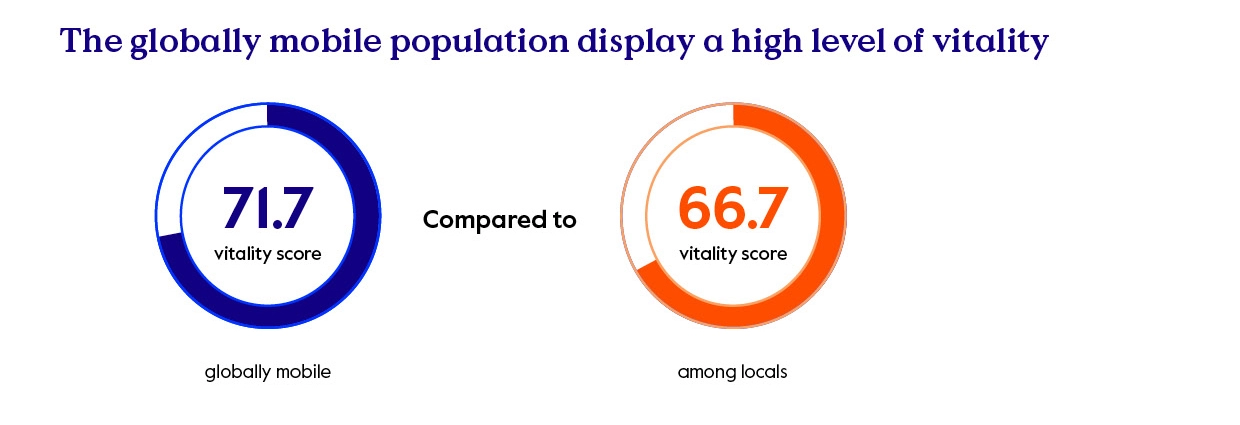
Drivers of vitality: motivated by more than money
Among the globally mobile population, vitality is primarily driven by intellectual and environmental well-being, with 59% agreeing that they “value learning new things and learning more and more” and 54% saying they “know places they can go in which they feel safe and well.”
Financial well-being remains a weak point, with only 36% reporting this to be “excellent” or “very good”. This struggle is exacerbated by the cost-of-living crisis, which is a stated cause of stress for 43% of globally mobile people, echoing the trend we see worldwide. Despite these persistent financial concerns, we see many choosing to remain living overseas, suggesting that their decision is not solely driven by financial motives. This nuanced picture of motivation suggests that for many, the benefits of a global lifestyle outweigh the financial drawbacks.
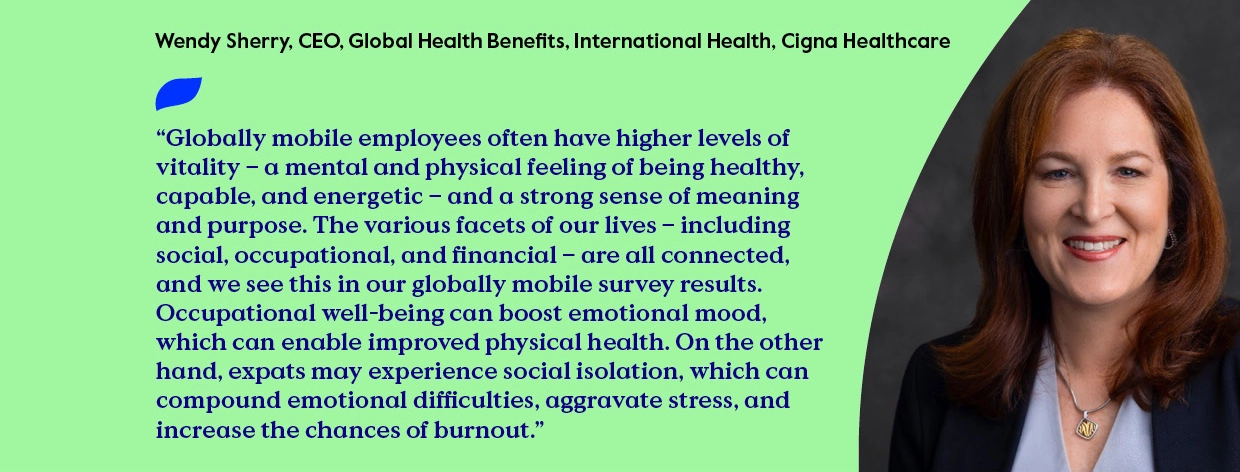
Family well-being emerges as another strength for globally mobile individuals, with two-thirds (66%) rating theirs as “excellent” or “very good”. Despite encountering personal challenges, such as financial pressures, those leading a globally mobile lifestyle often view their choices as a form of sacrifice for the benefit of their loved ones. This underscores the intricate relationship between personal and familial well-being within the globally mobile community.
The changing overseas dream: where do the globally mobile feel most successful?
Most globally mobile individuals are satisfied with their decision to relocate. Specifically, almost half of them (49%) rate their move to their current market as 'very successful,' while an additional three in 10 (30%) deem it to be 'somewhat successful.'
The primary factor influencing their satisfaction with their move (26% gap between highest and lowest perceived success) is financial vitality, indicating the importance of having the means to support oneself financially. Moreover, financial freedom provides the globally mobile with increased resilience in facing challenges and facilitates access to essential resources like healthcare.
However, there are notable regional variations in the satisfaction levels of foreign professionals. In the Middle East and Africa (MEA) region, satisfaction with relocation is notably high, with the UAE (90%), Saudi Arabia (86%), and Kenya (86%) reporting the highest levels of perceived success.
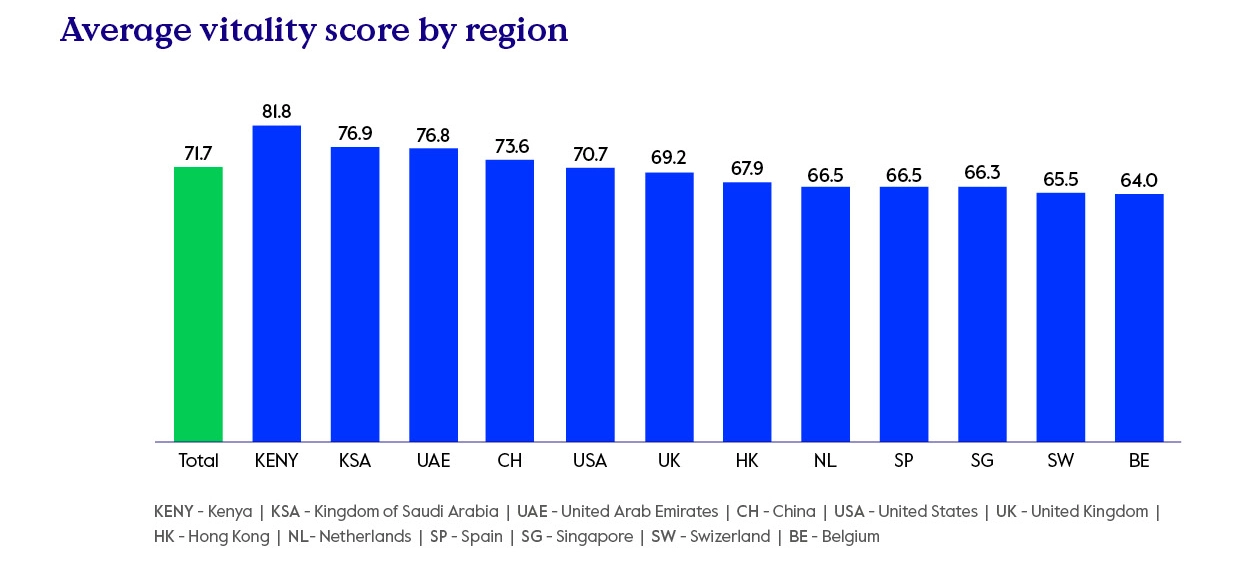
In Europe, satisfaction levels vary among countries, with Switzerland (70%), Spain (71%), and the UK (68%) reporting relatively high rates, while Belgium (61%) and the Netherlands (64%) show slightly lower levels. Satisfaction levels also vary within Asia, from 87% in mainland China and 74% in Singapore to 56% in Hong Kong. However, despite higher levels of satisfaction in markets like MEA, top expat destinations for those who wish to relocate are Canada, Australia, the US, and the UK, followed by Western Europe and New Zealand.
These regional disparities underscore the importance of tailored support and resources to facilitate successful transitions and integration into new environments. As the profile of the globally mobile continues to evolve, employers must adapt and respond by providing the necessary support to ensure the well-being and success of their workforce.
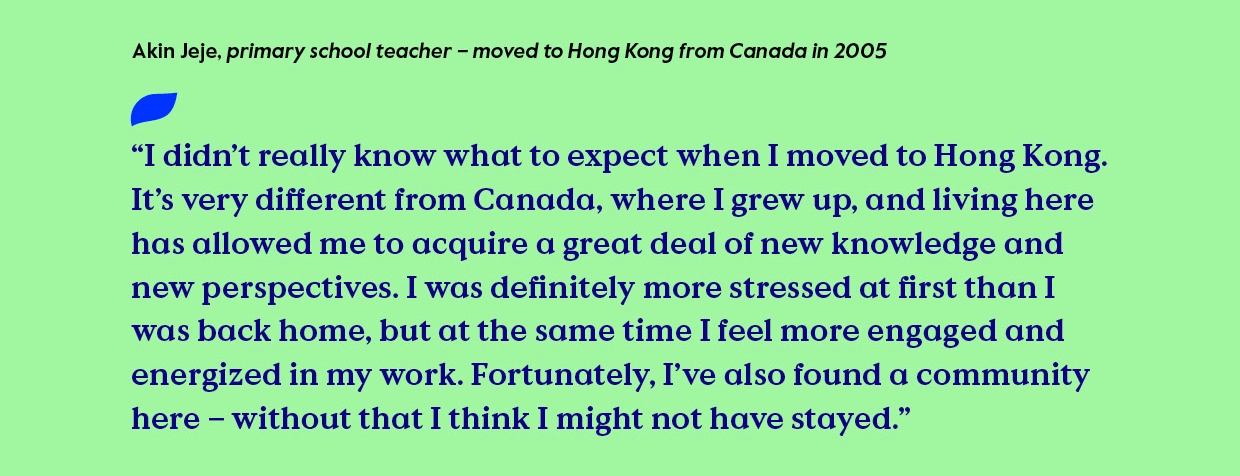
Navigating challenges
Despite most globally mobile individuals being content with their relocation, nearly four out of five (77%) have encountered at least one challenge in the past six months.
Financial difficulties (38%) emerge as the most prevalent challenge, particularly as the rising cost of living proves to be a universal stressor. Following closely are feelings of homesickness (23%), struggles with work/life balance (18%), and health-related issues such as access to healthcare (18%). The rising cost of living is also having broader impacts, with seven in 10 (70%) say that inflation is making it too expensive to stay healthy.
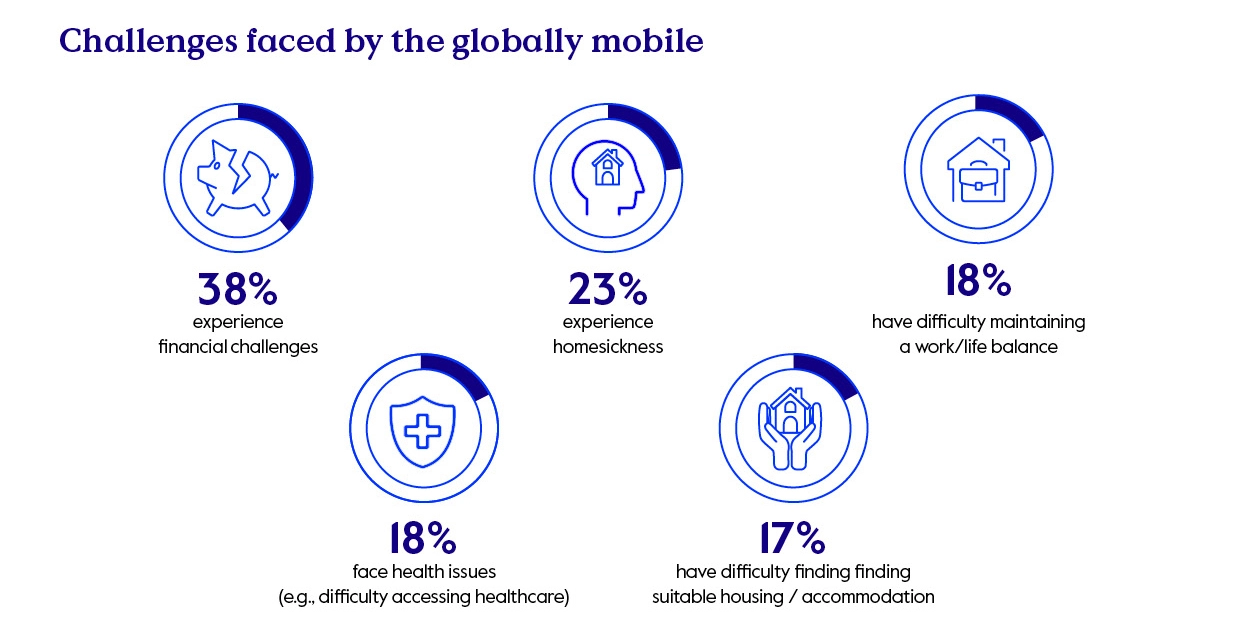
In the Middle East and Africa (MEA), a higher proportion of globally mobile individuals encounter challenges compared to other markets, despite more reporting successful relocations. 90% in the MEA region said they have faced at least one challenge in the past six months. MEA expatriates are more likely to experience homesickness and a lack of employer support compared to other regions. Yet globally mobile individuals in the MEA region demonstrate better health across various dimensions, which suggests the presence of robust in-market support systems spanning family, social networks, and the workplace.
In Asia, globally mobile individuals are more prone to encountering work-related challenges, with 15% of them reporting this as a concern. This figure is higher in mainland China (24%) and Hong Kong (22%).
In Hong Kong we also see a higher incidence of globally mobile respondents saying their move has been a failure, and 91% express a desire for support before or during relocation. Specifically, Hong Kong-based foreign respondents seek more assistance in navigating local healthcare, with 40% expressing this need compared to 28% in other regions.
A unique stress profile
Globally mobile individuals grapple with a unique set of challenges. They experience high levels of stress and burnout, more-so than among locals, with 86% reporting stress – 19% of whom find it unmanageable.
Particularly concerning is the prevalence of extreme stress and burnout among the globally mobile, with a staggering 96% experiencing burnout. They are especially susceptible to feelings of detachment or loneliness, self-doubt, and negative outlook.
The incidence of stress is notably pronounced in Asia and the MEA region. In Asia, stress levels are at 89% in Singapore and 91% in Hong Kong. In the UAE and Saudi Arabia, they reach 90%, and 94% in Kenya. Conversely, in Europe, particularly in Spain and the Netherlands, stress levels are comparatively low, at 79% and 67%, respectively.

It is particularly striking that globally mobile employees are living with higher stress levels than locals while also displaying higher vitality. Overall however, the globally mobile reported better mental well-being than their local counterparts (58% vs 42% with excellent or very good mental well-being). This could indicate that while foreign professionals are confronted with mounting stress, they are more capable of maintaining balance and not allowing stress to impact their sense of wellness.
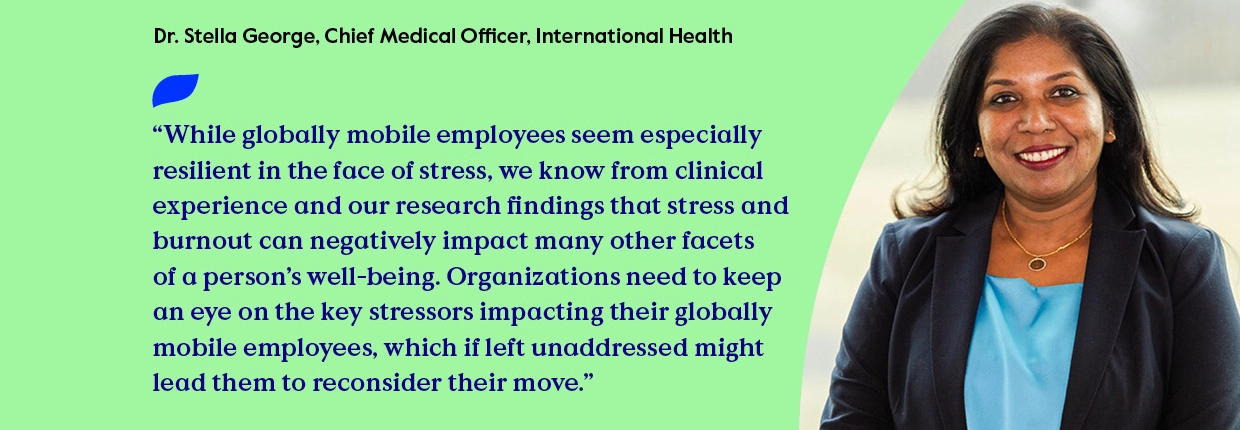
A similar pattern emerges in their relationship with work. Globally mobile individuals are more likely to feel constantly connected to work and to work overtime, while simultaneously deriving greater satisfaction from their job. Most globally mobile workers (79%) report feeling constantly connected to work and three in 10 say they regularly work overtime, although the incidence of both have decreased from the previous year.
The correlation between high vitality and high stress among globally mobile individuals may suggest their adaptive mindset or willingness to embrace stress as a natural aspect of relocation. However, it is critical to recognize that this group still requires support. Globally mobile individuals express a strong desire to reassess their priorities (63%) and to have more support to lead healthier lives (68%). This emphasizes the opportunity employers have to step up and enhance the well-being of one of their most crucial employee demographics.
Rethinking the employer’s role
Overall, the globally mobile maintain positive relationships with their jobs and workplaces. Over four in 10 (44%) describe their work well-being as "excellent" or "very good," up from 40% in 2022. This may be linked to the strong desire for intellectual stimulation – a key contributor to their vitality – which motivates the globally mobile to pursue person development and experience fulfillment at work.
Furthermore, globally mobile employees are more receptive to employers’ efforts to boost well-being. They are inclined to believe that their employers recognize the importance of personal and mental health, with 65% expressing agreement.
However, they are also aware of their employers’ competing priorities, with 59% saying that their employers prioritize productivity over mental well-being. Employers must strike the balance between productivity goals and well-being initiatives to cultivate a genuinely supportive work environment that nurtures overall vitality.
Most globally mobile individuals (69%) desire greater support from their employers. When it comes to a robust health and well-being program, top elements include private health insurance (preferred by 71% of globally mobile respondents) – especially coverage that extends worldwide, flexible time-off and work arrangements (40%), and mental health support (33%).
Employers now have an opportunity to rethink their approach to supporting employees, particularly for the positive and adventurous globally mobile group. For foreign professionals, work can be all-encompassing, serving as a crucial support system, a source of purpose, and a center of social connections. This differs from the experience of local employees, where the boundaries between personal and professional life may be more distinct. It is critical that employers address intellectual stimulation, environmental safety, and social connection, which are the top drivers of overall vitality, and focus on fostering a sense of connection and community at work.
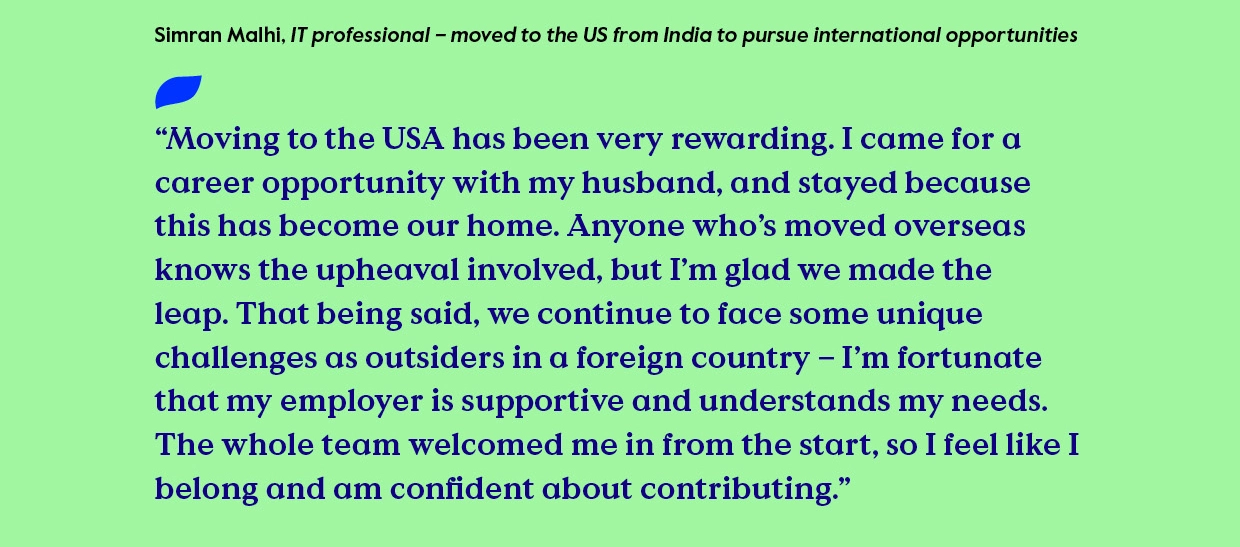
Conclusion
Our Vitality Study underscores the imperative for employers to elevate their efforts in fostering vitality, not only within the globally mobile workforce but across the entire organization. A comprehensive approach is essential – employers must address work-life balance, facilitate social well-being, and provide support that goes beyond just physical and mental dimensions of health.
Globally mobile employees emerge as a highly valuable and resilient segment of the workforce. Despite facing unique stressors associated with their situation, they exhibit distinct skills and a high level of motivation, resulting in higher vitality. Not all stress is harmful – some foreign professionals leverage stress as a motivational force, which may be why they derive greater satisfaction from work. Their dedication to their work is evident, and they are more open to seeking improved opportunities by changing locations.
The interconnectedness of various aspects of their health, alongside the continued desire among the community to remain globally mobile, highlights the importance of ongoing support and understanding from employers. By doing so, organizations can foster a workplace culture that attracts, retains, and optimally utilizes the talents of globally mobile professionals, while also improving the vitality of all their employees.
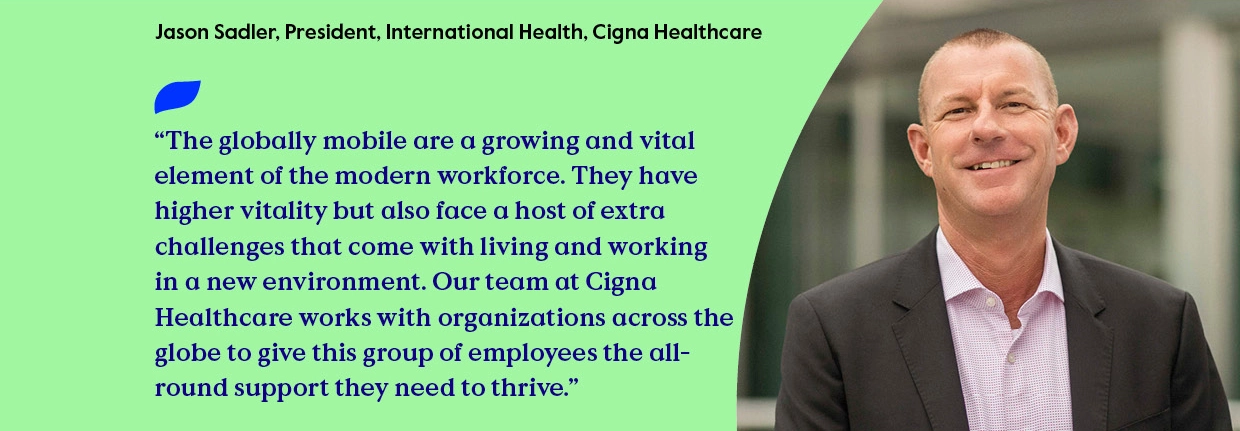
About the research
We surveyed more than 10,800 respondents, including more than 2,600 globally mobile individuals, in 12 markets – the US, UK, Spain, Netherlands, Belgium, Switzerland, Kenya, UAE, Saudi Arabia, mainland China, Singapore, and the Hong Kong SAR – between May and June 2023.
The Evernorth Vitality IndexSM
The index has been developed in partnership with leading clinical psychologist and author Dr. Richard Ryan. Designed in 2021 using Dr. Ryan’s Self-Determination Theory and Subjective Vitality Scales (SVS), it gives a comprehensive measure of people’s capacity to pursue life with health, strength, and energy. This is closely aligned with our mission to improve the health and vitality of those we serve around the world.
Related articles
©Cigna 2025
This article serves only as a reference and is intended for informational purposes only. Nothing in this article constitutes legal, tax, financial planning, health or medical advice including diagnosis or treatment. Any reference to products or services offered by Cigna are available except where prohibited by applicable law and subject to terms and conditions.
Download the Vitality Study - Globally Mobile Edition
Contact Us
Whether you wish to speak to our sales team or get general help if you are already a Cigna Healthcare® member, we’ll get you to the right information.
Contact InformationPopular Links
Resources
© Cigna Healthcare. All rights reserved.
*Please note, this is a representation of the benefits available and does not contain the terms, conditions, and exclusions specific to each benefit. The benefits may be subject to change. Some benefits may be part of an optional module. Please see the Customer Guide for full details.
This website is provided by Cigna European Services (UK) Limited, a company incorporated in England and Wales having its registered address at 13th Floor, 5 Aldermanbury Square, London EC2V 7HR and registered number 00199739. The Cigna Healthcare name, logo and other Cigna Healthcare marks are owned by Cigna Intellectual Property, Inc., licensed for use by The Cigna Group and its operating subsidiaries.
Our Policies are underwritten by Cigna Global Insurance Company Limited, a private limited company under Guernsey Law, with registered address office at PO Box 155, Mill Court, La Charroterie, St Peter Port, Guernsey, GY1 4ET, and company number 41925. Cigna Global Insurance Company Limited is authorised and regulated by the Guernsey Financial Services Commission for the conduct of insurance business in Guernsey.
This communication is being issued and/or distributed by Cigna Insurance Management Services (DIFC) Limited which is regulated by the Dubai Financial Services Authority.
Selecting these links will take you away from Cignaglobal.com. Cigna Healthcare does not control the linked sites' content or links.

